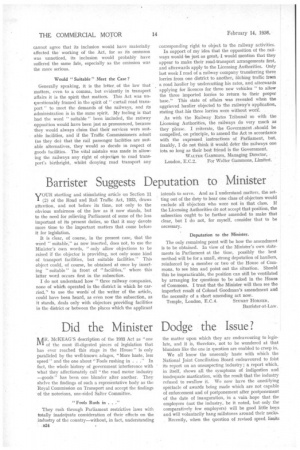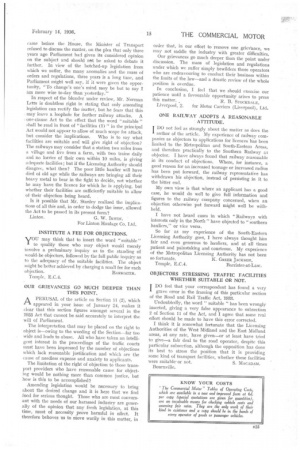Did the Minister Dodge the Issue?
Page 34

Page 35

If you've noticed an error in this article please click here to report it so we can fix it.
NArR. McKEAG'S description of the 1933 Act as "one 11'1 of the most ill-digested pieces of legislation that has ever reached this stage in the House" is only paralleled by the well-known adages, "More haste, less speed" and the one about "Fools rushing in . . ." In fact, the whole history of government interference with what they affectionately call the road motor industry —goods" has been one blunder after another. They shelve the findings of such a representative body as the Royal Commission on Transport and accept the findings of the notorious, one-sided Salter Committee.
"Fools Rush in . . ."
They rush through Parliament restrictive laws with totally inadequate consideration of their effects on the _industry of the country—without, in fact, understanding 824 the matter upon which they are endeavouring to legislate, and it is, therefore, not to be wondered at that blunders like the one in question are enabled to creep in.
We all know the unseemly haste with which the National Joint Conciliation Board endeavoured to foist its report on an unsuspecting industry ; a report which, in itself, shows all the symptoms of indigestion and inadequate mastication, with the result that the industry refused to swallow it, We now have the unedifying spectacle of awards being made which are not capable of enforcement and of postponement after postponement of the date of inauguration, in a vain, hope that the employers (not the industry, be it noted, but only the comparatively, few employers) will be good little boy and will voluntarily hang millstones around their necks.
Recently, when the question of revised speed limits
came before the House, the Minister of Transport refused to discuss the matter, on the plea that only three years ago Parliament had given its considered opinion on the subject and should net be asked to debate it further. In view of the botched-up legislation from which we suffer, the many anomalies and the mass of orders and regulations, three years is a long time, and Parliament might well say, if it were given the opportunity, "To change's one's mind may be but to say I am more wise to-day than yesterday."
In respect of the blunder under review, Mr. Norman Lefts is doubtless right in stating that only amending legislation can rectify the matter, but he fears that this may leave a loophole for further railway attacks. A . one-clause Act to the effect that the word "suitable " shall be read in front of "facilities (1) " in the principal Act would not appear to allow of much scope foi attack, but consider the implications. Who is to say what facilities are suitable and will give right of objection? The railways may consider that a station two miles from a village and five from a farm, with two trains daily and no lorries of their own within 10 miles, is giving adequate facilities ; but if the Licensing Authority should disagree, what then? The poor little haulier will have died of old age while the railways are bringing all their heavy metal to bear in the fight to decide, not whether he may have the licence for which he is applying, but whether their facilities are sufficiently suitable to allow of their objection being heard.
Is it possible that Mr. Stanley realized the implications of all this and, in order to dodge the issue, allowed the Act to be passed in its present form?
Linton. G. W. rRWIN,
For Linton Haulage Co, Ltd.
INSTITUTE A FEE FOR OBJECTIONS.
VOU may think that to insert the word " suitable " I to qualify those who may object would merely involve a preliminary inquiry as to the standing of would-be objectors, followed by the full public inquiry as to the adequacy of the suitable facilities. The object might be better achieved by charging a small fee for each
objection. BARRISTER. Temple, E.C.4.
OUR GRIEVANCES GO MUCH DEEPER THAN THIS POINT.
APERUSAL of the article on Section 11(2), which appeared in your issue of January 24, makes it clear that this section figures amongst several in the 1933 Act that cannot be said accurately to interpret the will of Parliament.
The interpretation that may be placed on the right to object is—owing to the wording of the Section—far too wide and leads to abuse. All who have taken an intelligent interest in the proceedings of the traffic, courts must have been impressed by the number of objections which lack reasonable justification and which are the cause of needless expense and anxiety to applicants.
The limitation of the right of objection to those transport providers Who have reasonable cause for objecting would be nothing more than common justice, but how is this to be accomplished?
Amending legislation would be necessary to bring about the desired change and it is here that we find food for serious thought. Those who are most conversant with the needs of our harassed industry are generally of the opinion that any fresh legislation, at this time, must of necessity prove harmful in effect. It therefore behoves us to niove warily in this matter, in order that, in our effort to remove one grievance, we may not saddle the industry with greater difficulties.
Our grievances go much deeper than the point under discussion. The mass of legislation and regulations under which we suffer simply bewilders those operators who are endeavouring to conduct their business within the limits of the law—and a drastic review of the whole position is overdue.
In conclusion, I fed that we should exercise our patience until a favourable opportunity arises to press this matter. R. B: STOCKDALE, Liverpool, 2. for Motor Carriers (Liverpool), Ltd.
ONE RAILWAY ADOPTS A REASONABLE ATTITUDE.
DO not feel as strongly about the matter as does the I author of the article. My experience of railway companies as objectors to applications for licences has been limited to the Metropolitan and South-Eastern Areas, and therefore practically to the Southern Railway as objector. I have always found that railway reasonable in its conduct of objections. Where, for instance, a good reason for an increased tonnage or increased radius has been put forward, the railway representative has withdrawn his objection, instead of persisting in it to the bitter end.
My own view is that where an applicant has a good case, he would do well to give full information and figures to the railway company concerned, when an objection otherwise put forward might well be withheld.
I have not heard cases in which "Railways with interests only in the North" have objected to "southern hauliers," or vice versa.
So far as my experience of the South-Eastern Licensing Authority goes, I have always thought him fair and even generous to hauliers, and at all times patient and painstaking and courteous. My experience of the Metropolitan Licensing Authority has not been
so fortunate. K. GREER JACKSON,
Temple, E.C.4. Barrister-at-Law.
OBJECTORS STRESSING TRAFFIC FACILITIES WHETHER SUITABLE OR NOT.
I DO feel that your correspondent has found a very grave error in the framing of this particular section of the Road and Rail Traffic Act, 1933.
Undoubtedly, the word "suitable "has been wrongly inserted, giving a very false appearance to subsection 2 of Section 11 of the Act, and I agree that some real effort should be made to have this error corrected.
I think it is somewhat fortunate that the Licensing Authorities of the West Midland and the East Midland areas, at any rate, have given—or at least have tried to give-_a fair deal to the road operator, despite this particular subsection, although the opposition has done its best to stress the position that it is providing some kind of transport facilities, whether these facilities were suitableor not. S. MACADAM. Bournville,




















































































